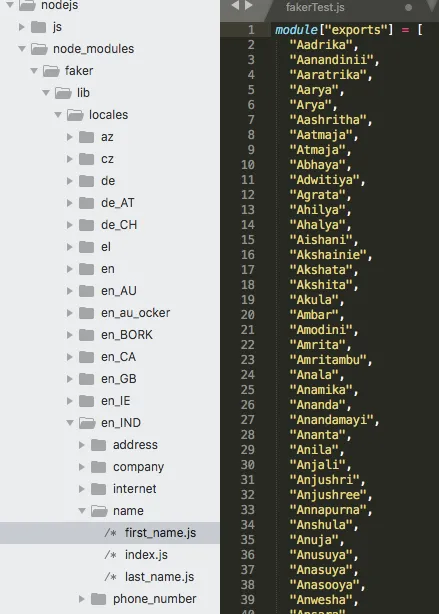Data mocking using Faker
Published:
Ideally, test data is of priority and the project teams always face an issue in getting the relevant and realistic test data for pre-production activities. More issues(refresh of data; data manipulations etc.,) arise, when programs consume data from a shared environment. Sometimes, requirements of data varies and a new set of data should be replicated through external tools and technologies. Many commercial data mocking/stubbing tools are available in the market, but as a open source lover, I recommend using Faker library.

Faker is a open source data mocking library that is available in Java, Python, Ruby and JavaScript. This post shares information on how to
- use faker.js?
- add new data set
- customize the data?
Below are the steps to follow
Step#1:
Install faker.js nodejs module. Step 2: Now, declare the faker module inside your js file and invoke the data.
var data = require('faker');
// name moduele contains the firstname and lastname functions and this will retrieve n
var firstname = data.name.firstName();
var lastname = data.name.lastName();
//Customized format of test data
data.fake(", "));
// outputs: "Uday, Kumar Mr."
Faker have a pre-defined format of test data to supports different categories as below:

Step#2:
How to customize the test data.Localization is possible with below code:
data.locale = "en_IND";
modify the data in node_modules/faker/lib/en_IND/name/first_name.js according to your

Step#3:
Define new modules and test data in the faker.js .For instance, add a aadhar number module.
- Add aadhar.js file at node_modules/faker/lib
- Now add below line in /node_modules/faker/lib/locales/en_IND/index.js en_IND.aadhar = require(“./aadhar”);
- Now add folder named aadhar under /node_modules/faker/lib/locales/en_IND/aadhar.
Add three js files : default_country.js, index.js,
default_country.js:
module["exports"] = [
"India",
"Indian Republic",
"Bharat",
"Hindustan"
];
index.js:
var aadhar = {};
module['exports'] = aadhar;
aadhar. uniqueIdentity = require("./uniqueIdentity");
uniqueIdentity.js
module["exports"] = ["Ahsdfjh10303"];
Also add the below code at /node_modules/faker/lib/index.js
var Aadhar = require('./aadhar');
self.aadhar = bindAll(new Aadhar(self));
var _definitions = {
"name": ["first_name", "last_name", "prefix", "suffix", "title", "male_first_name", "female_first_name", "male_middle_name", "female_middle_name", "male_last_name", "female_last_name"],
"aadhar":['uniqueIdentity'],
"address": ["city_prefix", "city_suffix", "street_suffix", "county", "country", "country_code", "state", "state_abbr", "street_prefix", "postcode"],
"company": ["adjective", "noun", "descriptor", "bs_adjective", "bs_noun", "bs_verb", "suffix"],
"lorem": ["words"],
"hacker": ["abbreviation", "adjective", "noun", "verb", "ingverb"],
"phone_number": ["formats"],
"finance": ["account_type", "transaction_type", "currency", "iban"],
"internet": ["avatar_uri", "domain_suffix", "free_email", "example_email", "password"],
"commerce": ["color", "department", "product_name", "price", "categories"],
"database": ["collation", "column", "engine", "type"],
"system": ["mimeTypes"],
"date": ["month", "weekday"],
"title": "",
"separator": ""
};
Step#4:
Now time to test to aadhar number is available
var data = require('faker');
data.locale = "en_IND";
console.log("Aadhar number : "+data.aadhar.uniqueIdentity());
Result

References:
Faker documentation is available at Faker JS